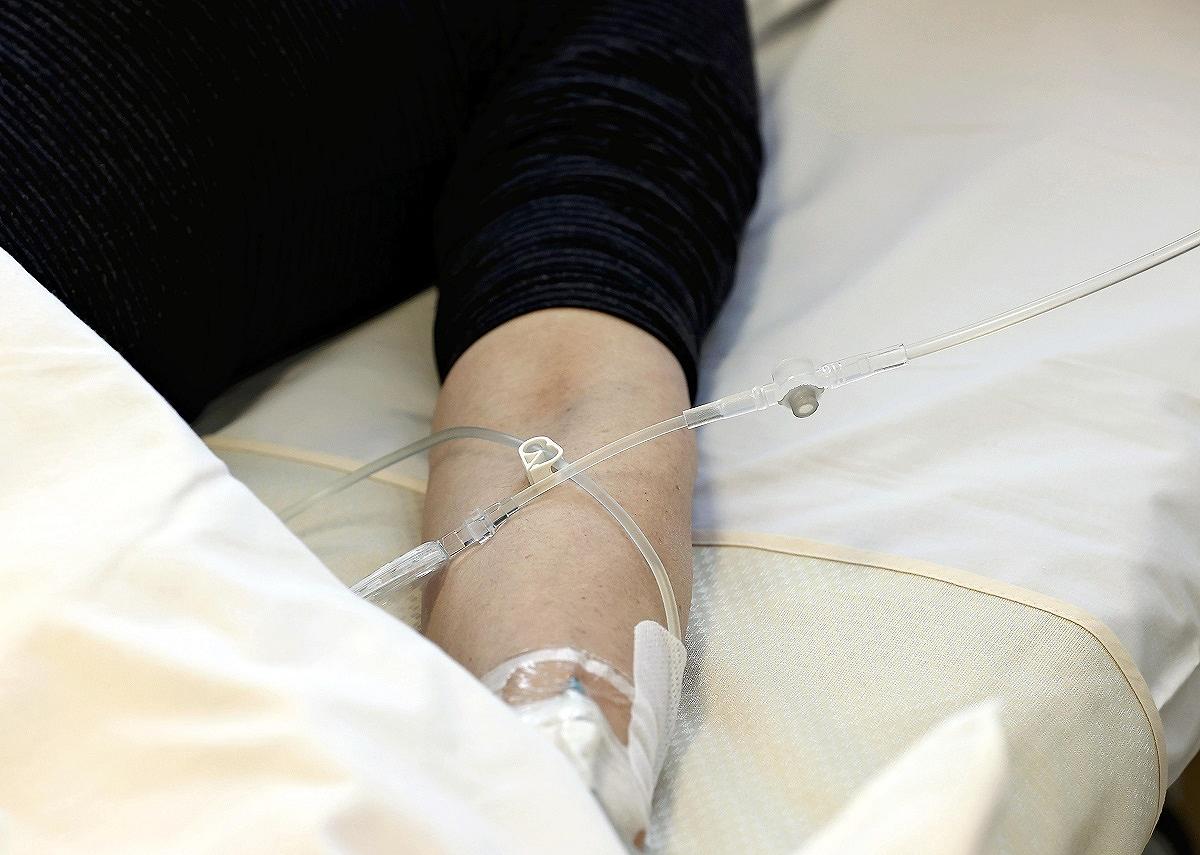
A patient receives an intravenous drip of Lecanemab in Tokyo on Monday.
17:16 JST, December 25, 2023
A Tokyo woman in her 50s became one of the first patients to receive a newly approved drug for Alzheimer’s disease as the Tokyo Metropolitan Institute for Geriatrics and Gerontology in Itabashi Ward, Tokyo, treated her with Lecanemab on Monday morning.
Marketed under the brand name Leqembi, the new drug is the first to be recognized as slowing the progression of dementia by removing an abnormal protein called amyloid-beta that accumulates in the brain. The drug was approved by the state in September and has been covered by national health insurance since Wednesday.
The woman’s husband began to notice her forgetfulness around the summer of 2020, and she was diagnosed to be in the early stages of Alzheimer’s disease in autumn last year. Tests confirmed the accumulation of amyloid-beta in her brain.
On Monday, the woman’s condition was checked by Ryoko Ihara, the head of neurology at the institute. She was then treated with the drug via intravenous drip over an hour, starting a little past 9:30 a.m.
After the treatment, the patient remained at the hospital for a while to confirm she was not having an allergic reaction or other problems.
“I’m relieved to finally get the drug,” the woman said. “I want to take care of myself so I can continue my life as before.”
The woman is scheduled to visit the hospital every two weeks to receive an IV of the new drug. She will also regularly undergo MRI scans.
The Osaka Metropolitan University Hospital also administered Lecanemab to a man in his 50s on Thursday. According to Akitoshi Takeda of the hospital’s neurology department, the man is an outpatient suffering from early-onset dementia.
Lecanemab was developed by leading Japanese pharmaceutical company Eisai Co. jointly with a U.S. drug company. The drug is targeted only to patients in the early stages of Alzheimer’s disease.
Clinical tests found that the progression of symptoms slowed by 27% among people who received the drug once every two weeks for 1½ years. However, Lecanemab is not effective in restoring lost cognitive function.
Alzheimer’s disease is believed to account for 60% to 70% of dementia cases. Amyloid beta — which is thought to damage nerve cells and thereby cause brain atrophy — is believed to gradually accumulate in the brain 10 to 20 years before symptoms such as memory impairment start to appear.
The World Health Organization estimates there are about 55 million dementia patients globally.
Top Articles in Society
-

JAL, ANA Cancel Flights During 3-day Holiday Weekend due to Blizzard
-

Man Infected with Measles May Have Come in Contact with Many People in Tokyo, Went to Store, Restaurant Around When Symptoms Emerged
-

Australian Woman Dies After Mishap on Ski Lift in Nagano Prefecture
-

Foreign Snowboarder in Serious Condition After Hanging in Midair from Chairlift in Nagano Prefecture
-

Record-Breaking Snow Cripples Public Transport in Hokkaido; 7,000 People Stay Overnight at New Chitose Airport
JN ACCESS RANKING
-

Univ. in Japan, Tokyo-Based Startup to Develop Satellite for Disaster Prevention Measures, Bears
-

JAL, ANA Cancel Flights During 3-day Holiday Weekend due to Blizzard
-

Japan Institute to Use Domestic Commercial Optical Lattice Clock to Set Japan Standard Time
-

China Eyes Rare Earth Foothold in Malaysia to Maintain Dominance, Counter Japan, U.S.
-

Japan, Qatar Ministers Agree on Need for Stable Energy Supplies; Motegi, Qatari Prime Minister Al-Thani Affirm Commitment to Cooperation

















